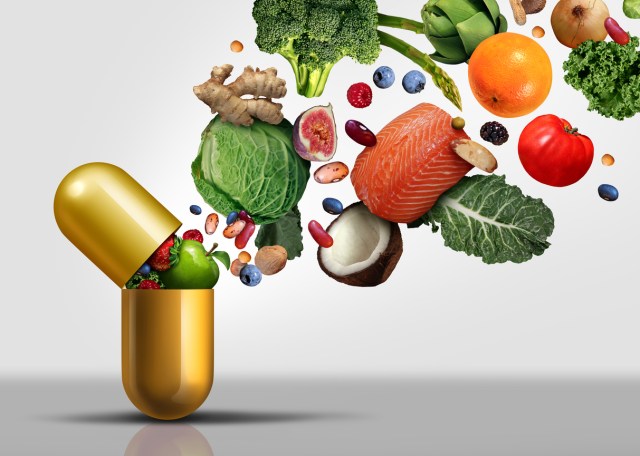
- The Facts Behind America’s Public Health Crisis
- Bad Heath Comes at a High Cost
- Why Food Should Be Considered Medicine
- A Low Carb Diet May Be Your Preventive Medicine
- Small Changes, Big Results with Atkins 100 TM
- How Atkins 100 Works
Food is Medicine
Why a low carb diet may offer benefits beyond just weight loss.
You may start a low carb diet with a short-term goal in mind, such as getting in shape for a trip to the beach or looking good at a wedding, but what you eat may also have a long-lasting effect on your health. Now, more than ever. According to statistics gathered by the Centers for Disease Control (CDC), America is facing a public health crisis, where many adults are sick with at least one diet-related disease. Let’s look at the facts behind this public health crisis and learn why a low carb diet may be a potential nutrition solution.
The Facts Behind America’s Public Health Crisis
Here are the hard facts from the CDC:
- Nearly three out of every four adults 20-years and older are overweight or obese (73.6%), with obesity prevalence, specifically, at 42.4%. This can lead to type 2 diabetes, heart disease, and some cancers, which are among the leading causes of preventable, premature death.
- More than one in 10 (12%) adults aged 20 years and older have high total cholesterol (>240mg/dl), and nearly two in 10 (17%) have low HDL “good” cholesterol (<40 mg/dl).
- More than one out of every three adults (88 million) have prediabetes (and 8 in 10 are unaware of their status).
- Just under one out of every 10 adults (34.2 million) have diabetes (and 1 in 5 are unaware of their status).
- Type 2 diabetes accounts for 90-95% of all diagnosed cases:
- Type 2 diabetes onset is associated with weight status, family history, activity level and age.
- Dietary changes and losing weight can cut the risk of developing type 2 diabetes in half.
- Nearly half of adults in the United States (47%, or 116 million) have hypertension, defined as a systolic blood pressure greater than 130 mmHg or a diastolic blood pressure greater than 80 mmHg or are taking medication for hypertension.
- About one out of three U.S. adults met the definition and criteria for Metabolic Syndrome. Metabolic Syndrome is a cluster of cardiometabolic risk factors associated with increased risk of multiple chronic diseases, including cancer and cardiovascular disease.
Bad Heath Comes at a High Cost
The costs of diet-related health issues go beyond just the physical aspects, but also comes with a steep monetary cost. According to the CDC:
- People with type 2 diabetes have medical costs and lost wages now totaling $327 billion.
- People with obesity, on average, have medical costs of $147 billion, annually, with medical costs for obese people to be $1,429 higher than medical costs for people with a healthy weight.
- High blood pressure costs the United States about $131 billion each year, averaged over 12 years from 2003 to 2014.
- Among Medicare participants, study findings show costs to be 20% significantly higher among those with Metabolic Syndrome compared to those without the condition.
Why Food Should Be Considered Medicine
“Let food be thy medicine and medicine by thy food.”—Hippocrates
What do you think is going to make you feel better, have more energy and improve your health? A diet that consists of fast food and processed food high in sugar and low in nutrients or foods such as healthy protein and fats, and plenty of nutrient-rich fresh vegetables and low-glycemic fruits and smart lower carbohydrate choices that help manage your blood sugar, fat storage and energy levels? The medical system is set up for treatment, not prevention, and leans toward prescribing a pill instead of advocating for a lifestyle change. For sure, medication is necessary in certain situations, but food can and should be considered medicine, and a prescription for good health.
In fact, in an analysis published in BMJ, Food is Medicine: Actions to Integrate Food and Nutrition Healthcare, the study authors state: “Data points to this potential for food and nutrition and their prominent role in prevention, management, treatment and even in some cases, reversal of disease.”
A Low Carb Diet May Be Your Preventive Medicine
“An ounce of prevention is worth a pound of cure.”—Benjamin Franklin
In other words, it’s easier to stop something from happening in the first place than to repair the damage after it has happened.
Even just cutting back to 130 grams of carbs a day is associated with weight loss/management, improving blood sugar/insulin control, lowering blood pressure, reducing cholesterol and risk factors for Metabolic Syndrome. You may experience additional health and weight loss benefits if you decrease your carb intake below 130 grams of carbs a day.
It’s also encouraging when the American Diabetes Association (ADA) now recommends a low carb diet to manage type 2 diabetes. The ADA also recognizes that a low carb diet could be beneficial to people who may not have been diagnosed with diabetes but are at risk for diabetes or have prediabetes.
Small Changes, Big Results with Atkins 100
While the average American consumes around 240 grams of carbs a day, Atkins 100 reduces your carbs to 100 grams of Net Carbs a day, which is right in line with the research that supports decreasing your carbs to 130 grams of carbs or fewer a day to reap the profound and preventive health benefits.
How Atkins 100 Works
If you’re motivated to make small changes in the way you eat with the big outcome of improving your health, here’s how Atkins 100 works:
- Eat 100 grams of Net Carbs a day
- Eat a minimum of 12 to 15 grams of Net Carbs of Foundation Vegetables.
- Spread out the remaining 85 grams of Net Carbs like this:
- Eat three meals a day of 25 grams of Net Carbs.
- Eat two snacks a day of 10 to 15 grams of Net Carbs.
- As part of these meals and snacks, eat three 4- to 6-ounce servings of protein a day.
- Include two servings of added fat a day, such as a pat of butter or a tablespoon of olive oil, in your meals and snacks.
- Make high-fiber food choices to help support stable blood sugar, energy levels and your appetite.
